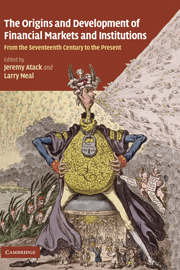 The Origins and Development of Financial Markets and Institutions
The Origins and Development of Financial Markets and Institutions Book contents
- Frontmatter
- Contents
- List of figures
- List of tables
- List of contributors
- Preface and acknowledgments
- 1 Financial innovations and crises: The view backwards from Northern Rock
- 2 An economic explanation of the early Bank of Amsterdam, debasement, bills of exchange and the emergence of the first central bank
- 3 With a view to hold: The emergence of institutional investors on the Amsterdam securities market during the seventeenth and eighteenth centuries
- 4 Was John Law's System a bubble? The Mississippi Bubble revisited
- 5 Sir George Caswall vs. the Duke of Portland: Financial contracts and litigation in the wake of the South Sea Bubble
- 6 The bell jar: Commercial interest rates between two revolutions, 1688–1789
- 7 Comparing the UK and US financial systems, 1790–1830
- 8 Natural experiments in financial reform in the nineteenth century: The Davis and Gallman analysis
- 9 Regulatory changes and the development of the US banking market, 1870–1914: A study of profit rates and risk in national banks
- 10 Anticipating the stock market crash of 1929: The view from the floor of the stock exchange
- 11 The development of “non-traditional” open market operations: Lessons from FDR's silver purchase program
- 12 The interwar shocks to US–Cuban trade relations: A view through sugar company stock price data
- 13 Central bank reaction functions during the inter-war gold standard: A view from the periphery
- 14 When do stock market booms occur? The macroeconomic and policy environments of twentieth century booms
- 15 Lessons from history for the twenty-first century
- Index
- References
8 - Natural experiments in financial reform in the nineteenth century: The Davis and Gallman analysis
Published online by Cambridge University Press: 04 August 2010
- Frontmatter
- Contents
- List of figures
- List of tables
- List of contributors
- Preface and acknowledgments
- 1 Financial innovations and crises: The view backwards from Northern Rock
- 2 An economic explanation of the early Bank of Amsterdam, debasement, bills of exchange and the emergence of the first central bank
- 3 With a view to hold: The emergence of institutional investors on the Amsterdam securities market during the seventeenth and eighteenth centuries
- 4 Was John Law's System a bubble? The Mississippi Bubble revisited
- 5 Sir George Caswall vs. the Duke of Portland: Financial contracts and litigation in the wake of the South Sea Bubble
- 6 The bell jar: Commercial interest rates between two revolutions, 1688–1789
- 7 Comparing the UK and US financial systems, 1790–1830
- 8 Natural experiments in financial reform in the nineteenth century: The Davis and Gallman analysis
- 9 Regulatory changes and the development of the US banking market, 1870–1914: A study of profit rates and risk in national banks
- 10 Anticipating the stock market crash of 1929: The view from the floor of the stock exchange
- 11 The development of “non-traditional” open market operations: Lessons from FDR's silver purchase program
- 12 The interwar shocks to US–Cuban trade relations: A view through sugar company stock price data
- 13 Central bank reaction functions during the inter-war gold standard: A view from the periphery
- 14 When do stock market booms occur? The macroeconomic and policy environments of twentieth century booms
- 15 Lessons from history for the twenty-first century
- Index
- References
- Type
- Chapter
- Information
- The Origins and Development of Financial Markets and InstitutionsFrom the Seventeenth Century to the Present, pp. 241 - 261Publisher: Cambridge University PressPrint publication year: 2009
References
- 1
- Cited by


